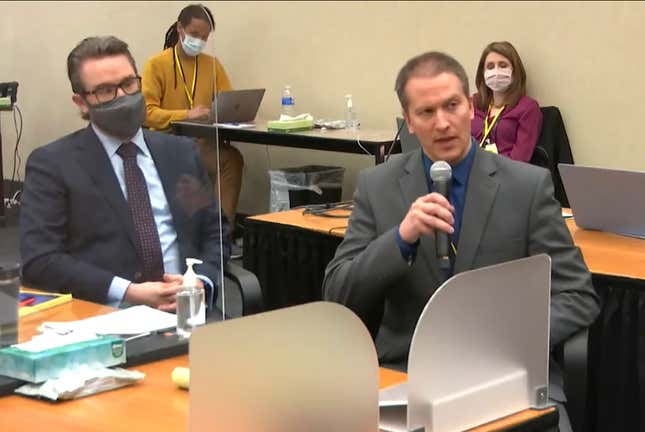
Derek Chauvin, the former Minneapolis cop who was convicted in the murder of George Floyd, was in court again on Thursday, this time to plead not guilty to violating the rights of a Black teenager during an arrest that was strikingly similar to the Floyd case.
Chauvin was federally indicted earlier this year in the 2017 case and is accused of depriving the then-14-year-old Black boy of his right to be free of unreasonable force during an arrest in which Chauvin allegedly hit the boy with a flashlight, held him down with his knee for nearly 17 minutes and ignored the teen when he said he couldn’t breathe.
More from the AP:
When U.S. Magistrate Judge Hildy Bowbeer asked how he would plead to the charge, Chauvin replied, “Not guilty, your honor.”
Thursday’s hearing was held via videoconference, and Chauvin appeared from the state’s maximum security prison, where he’s being held following his murder conviction. He was in a large room, and wearing a plain T-shirt as he sat at the head of a long table. No one was visible in the room with him, but a man was seen behind a window pane over Chauvin’s shoulder. He had some paper on the table in front of him and appeared to take notes.
Thursday’s hearing also addressed some pretrial motions, which were routine.
According to a police report from the 2017 encounter, Chauvin wrote that the teen resisted arrest and after the teen, whom he described as 6-foot-2 and about 240 pounds, was handcuffed, Chauvin “used body weight to pin” him to the floor. The boy was bleeding from the ear and needed two stitches.
That encounter was one of several mentioned in state court filings that prosecutors said showed Chauvin had used neck or head and upper body restraints seven times prior to Floyd’s death dating back to 2014, including four times state prosecutors said he went too far and held the restraints “beyond the point when such force was needed under the circumstances.”
Chauvin was convicted in April on state charges of second-degree unintentional murder, third-degree murder and second-degree manslaughter in Floyd’s 2020 death. He was sentenced to 22.5 years. During his trial, Chauvin’s lawyers successfully argued to keep the video of teen’s arrest—as well as other evidence meant to show how Chauvin had a habit of using knee and neck restraints during arrests—from being shown to the jury.
Chauvin and three other former officers—Thomas Lane, J. Kueng and Tou Thao—were arraigned on federal civil rights violations in Floyd’s death on Tuesday. All four pleaded not guilty.

